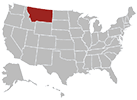
Are you looking for a new career as an optician?
In that case, you should look into becoming an optician in Montana.
There are many benefits to this job, so read on for information on training and certification.
Page Navigation
Optician Job Description and Duties in Montana
Opticians are required to provide clients with eye-wear for their particular needs and lifestyle.
Some of the job duties you will have on a daily basis include the following:
- Preparing eyewear
- Fitting and adjusting eyewear
- Educating customers about eyewear issues and maintenance
- Keeping sales records
- Determining insurance co-pays
- Keeping the inventory
- Interacting with the labs that make lenses
Optician Job Requirements in Montana
In Montana, you will need a license in order to get hired as an optician.
Plus, getting a license will also allow you to find a job a lot easier.
The exam for opticians in Montana is the American Board of Opticians (ABO) exam.
Or, you can sit for the National Contact Lens Examiner’s (NCLE) exam.
Licenses in this state are released by the Montana Board of Optometry.
You will also have to bring some documents, which include:
- A high school diploma or GED
- Graduating from a training program or having a formal education
- An associate’s degree diploma is highly appreciated by employers
- Good interpersonal skills
Optician Education in Montana
Currently, Montana doesn’t have any schools offering optometry or optician classes.
This doesn’t mean you can’t enroll in a program offered online or in a college from a different state.
Generally, the requirements for joining a program include:
- A high school diploma or GED
- Completing specific classes with a minimum grade of C
- 2 letters of recommendation
- OAT scores – not older than 5 years
- Minimum GPA of 2.75
You can also get into an internship or externship, in order to further develop your skills.
The programs vary between 7 months and 2 years.
The classes you will take include the following topics:
- Introduction to Optometry
- Ocular Anatomy
- Systems 1: Neuroscience
- Ocular Microbiology
- Ophthalmic Imaging
- Public Health Optometry
- Glaucoma
- Physics
Optician Certification in Montana
Once you finish your training program, you will be able to take the licensing exam.
Keep in mind that you also have to fulfill at least one requirements out of the following:
- A license in a reciprocal state
- At least 3 years of experience
- Can be an apprenticeship of 3 years in the past 6 years
- Can be from working as an optician in a state with no licensing requirements
- Graduate from an approved post-secondary optician program with a year of apprenticeship
In addition, you need to pass the National Opticianry Competency Examination (NOCE) with the ABO.
This optician licensing exam has no more than 3 levels of difficulty, which are:
- Beginner
- Intermediate
- Advanced
The topics for the first level are:
- Reading prescriptions,
- Fitting and dispensing spectacles
- Using standard ophthalmic equipment
The exam requires a fee of $200, which your employer will cover.
Those candidates who also choose to dispense contact lenses are required to take an extra exam.
This is the National Contact Lens Examiners.
Remember that you are required to also take the Contact Lens Registry Examination (CLRE).
The Contact Lens Registry Examination (CLRE) has a fee of $200.
This fee is generally paid by the company you work for.
The exam topics include the following:
- Pre-fitting for lenses,
- Diagnostic fitting,
- Dispensing of lenses,
- Patient education,
- Delivery
- Follow-up
The required paperwork you will need to submit includes:
- Age over 18
- A high school diploma or GED
- To fill out an application
- To pay some fees
- A clean criminal record
- Passing the State Practical Examination
- Proof of completed training, education, or at least 3 years of experience
Your optician license in Montana will expire after 2 years.
Before it expires, you have to renew it, which means you need to join an additional 36 hours of training.
Optician Employment and Salary in Montana
You can get hired in numerous places after getting hired, which include the following:
- Stores
- Offices
- Optometry practices
- Hospitals
- Clinics
Maybe you are wondering how much you will earn as an optician in Montana.
On average, you will make about $43,000 per year
But, you can earn up to $60,000 in large areas like Great Falls or Missoula.
Annual Salary Range:Average Salary of Opticians in Montana
| City Name | Salary |
|---|---|
| Billings | $45,997 |
| Missoula | $39,697 |
| Great Falls | $41,642 |
| Bozeman | $39,697 |
| Butte | $39,697 |
| Helena | $40,417 |
| Kalispell | $42,178 |
| Havre | $40,921 |
| Anaconda | $39,697 |
| Miles City | $45,277 |
Regional Salary in Montana
| Region | Employed | Avg. Annual Salary | Avg. Hourly Pay | Top 10% Annual Salary | Bottom 10% Annual Salary |
|---|---|---|---|---|---|
| Billings, MT | 90 | $43,830 | $21.07 | $64,630 | $28,680 |
| Great Falls, MT | 40 | $36,030 | $17.32 | $45,510 | $27,580 |
| Missoula, MT | 40 | $43,860 | $21.09 | $68,540 | $29,430 |
* Employment conditions in your area may vary.
Additional Information for Opticians in Montana
You might need some additional career resources, so check out the following:
- American Board of Opticianry (ABO) and National Contact Lens Examiners (NCLE)
- Association of Regulatory Boards of Optometry (ARBO)
- Montana Board of Optometry
- Montana Optometric Association
- National Board of Examiners in Optometry (NBEO)




